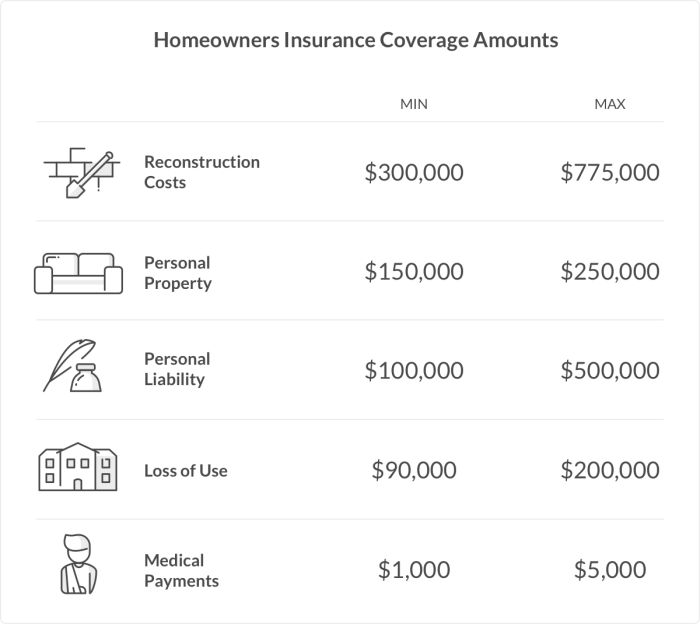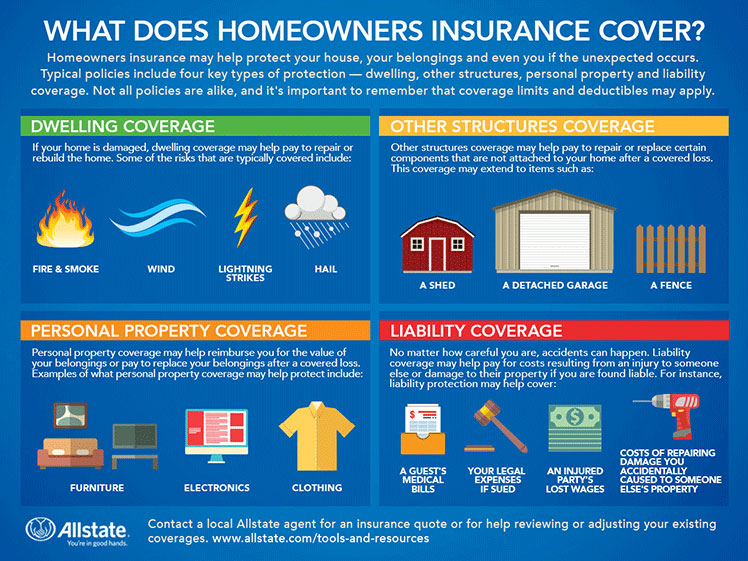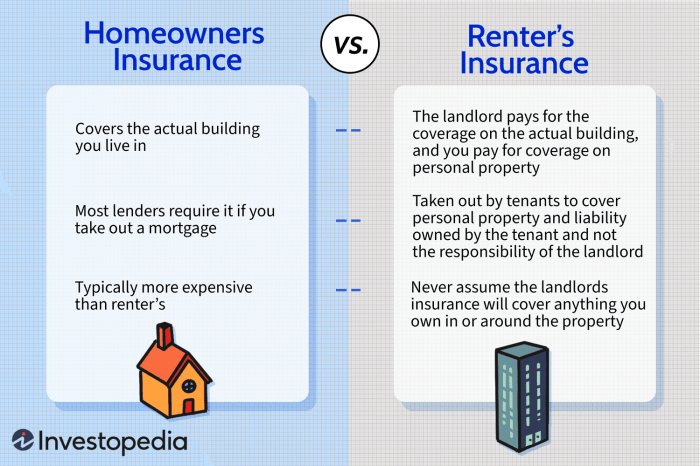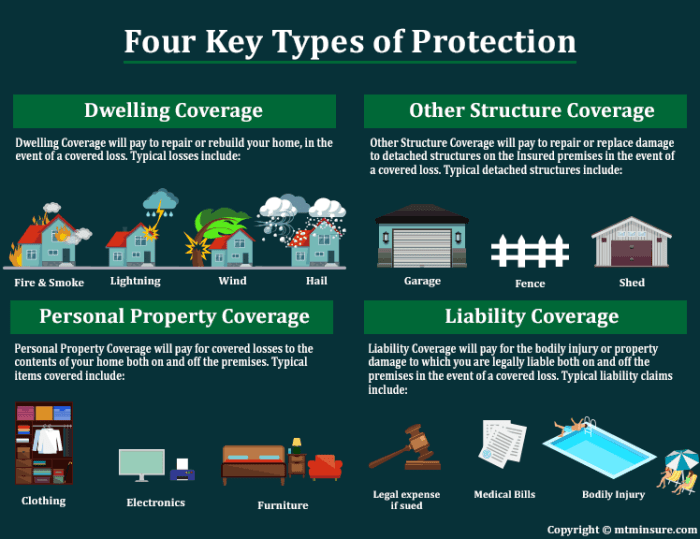What does homeowners insurance cover? It’s a question every homeowner should ask themselves. Homeowners insurance is your safety net, protecting your biggest investment from unexpected events. Think of it as a financial shield against the perils of life, covering you for everything from fire and theft to windstorms and hail.
But, like any insurance, there are nuances and details that can make a big difference in your coverage.
This guide will explore the ins and outs of homeowners insurance, covering everything from what’s typically included to common exclusions and how to choose the right policy for your needs. We’ll also dive into the factors that affect your premiums and how to file a claim if you ever need to.
So, buckle up, and let’s get into the nitty-gritty of homeowners insurance.
What is Homeowners Insurance?: What Does Homeowners Insurance Cover

Homeowners insurance is a type of property insurance that protects your home and belongings from a variety of risks, such as fire, theft, and natural disasters. It’s essential for most homeowners, as it can help you financially recover from unexpected events that could otherwise leave you with significant losses.
History of Homeowners Insurance
Homeowners insurance has evolved significantly since its inception. The earliest forms of property insurance emerged in the 17th century in England, primarily focused on protecting homes and businesses from fire. The concept gradually spread to the United States, with the first homeowners insurance policies being issued in the 18th century.
These early policies were limited in scope and often excluded coverage for specific risks, such as earthquakes and floods. Over time, homeowners insurance has become more comprehensive, encompassing a broader range of perils and offering more flexible coverage options. The development of standardized policies and the growth of the insurance industry have contributed to the widespread adoption of homeowners insurance as a crucial financial safety net for property owners.
Common Misconceptions About Homeowners Insurance, What does homeowners insurance cover
- Homeowners insurance covers everything.While homeowners insurance provides broad protection, it does not cover all types of losses. Certain perils, such as intentional acts of vandalism or damage caused by neglect, may not be covered. It’s crucial to review your policy carefully to understand the specific coverage you have.
- You only need homeowners insurance if you have a mortgage.While lenders often require homeowners insurance as a condition of financing, it’s a wise investment regardless of your mortgage status. It protects your personal assets and can help you rebuild your life in the event of a covered loss.
- You can save money by reducing your coverage.While you may be able to lower your premiums by reducing your coverage, it’s essential to ensure that your remaining coverage adequately protects your assets. Insufficient coverage could leave you with significant out-of-pocket expenses in the event of a major loss.
Common Covered Events

Homeowners insurance policies typically cover a range of events that could damage your home or belongings. These events are often categorized as perils, and understanding what they are and what they cover is crucial. Here’s a breakdown of common covered events:
Fire
Fire is one of the most common and devastating perils covered by homeowners insurance. This coverage extends to damage caused by fire, smoke, and water used to extinguish the fire. For instance, if your house catches fire due to a faulty electrical wiring, your insurance will cover the cost of repairs or replacement of the damaged property, including structural damage, personal belongings, and even living expenses while your home is being repaired.
Windstorm
Windstorms, including hurricanes, tornadoes, and high winds, can cause significant damage to your home. Homeowners insurance typically covers damage caused by wind, such as roof damage, broken windows, and fallen trees. However, it’s important to note that coverage for windstorms may have limitations, such as deductibles and windstorm exclusions.
Hail
Hailstorms can cause damage to your roof, siding, windows, and vehicles. Homeowners insurance typically covers hail damage, but there may be limits on the amount of coverage. If your roof is damaged by hail, your insurance policy will cover the cost of repairs or replacement, up to the policy limits.
Vandalism
Vandalism, which involves intentional damage to your property, is usually covered by homeowners insurance. This coverage can extend to damage caused by graffiti, broken windows, and other forms of vandalism. Your policy will cover the cost of repairs or replacement of the damaged property.
Theft
Theft, including burglary and robbery, is another common peril covered by homeowners insurance. This coverage extends to the loss of your personal belongings, such as jewelry, electronics, and furniture. Your insurance will cover the cost of replacing stolen items, up to the policy limits.
Personal Property Coverage
Your homeowners insurance policy protects your belongings, but not everything is covered. It’s essential to understand what’s included and what’s not.
Your policy covers personal property on your property and in your home, such as furniture, electronics, clothing, and jewelry. However, there are limits on how much you can recover for each item and in total. Your policy will also have a deductible, which is the amount you’ll pay out of pocket before your insurance kicks in.
Coverage Limits and Deductibles
Your policy’s coverage limits and deductibles are determined by the amount of coverage you choose and the value of your belongings. For example, you might choose a policy with a $100,000 coverage limit for personal property and a $1,000 deductible.
This means you would be responsible for the first $1,000 of any covered loss, and your insurance would cover the remaining $99,000.
Your policy may also have specific limits for certain types of personal property, such as jewelry or artwork. You can purchase additional coverage for these items, but it will cost more. It’s essential to understand your policy’s limits and deductibles and to choose a policy that meets your needs.
Documenting Your Personal Property
To make sure you’re adequately covered and can receive the appropriate compensation in case of a loss, it’s essential to document your belongings. You can do this by:
- Taking photos or videos of your belongings.
- Creating an inventory list of your belongings, including descriptions, purchase dates, and receipts.
- Keeping your inventory list and photos in a safe place, such as a fireproof safe or a cloud storage service.
You should also review your policy regularly and update your inventory list as needed. This will help ensure that your insurance policy meets your needs and that you’re adequately covered in case of a loss.
Liability Coverage

Liability coverage is a crucial part of homeowners insurance. It protects you financially if someone is injured or their property is damaged on your property, and you are found legally responsible. This coverage helps pay for legal defense costs, medical expenses, and property damage.
Common Situations Where Liability Coverage May Apply
Liability coverage can come in handy in many situations. For example, if a guest slips and falls on your icy sidewalk, or if your dog bites a neighbor, you could be held liable for their injuries.
Examples of Incidents That Could Trigger Liability Claims
- A child on your property is injured while playing on a swing set that you failed to maintain properly.
- You accidentally damage your neighbor’s fence while mowing your lawn.
- A tree on your property falls onto your neighbor’s house during a storm.
- A guest trips and falls on a loose rug in your living room.
- Your dog bites a visitor to your home.
Factors Affecting Homeowners Insurance Premiums
Your homeowners insurance premium isn’t a fixed number. Several factors play a role in determining how much you’ll pay each month. Understanding these factors can help you make informed decisions to potentially lower your premium.
Location
Your location is a significant factor in determining your homeowners insurance premium. Insurance companies consider the risk of natural disasters, crime rates, and the cost of rebuilding in your area. For example, if you live in an area prone to earthquakes, hurricanes, or wildfires, you can expect to pay higher premiums than someone living in a less risky area.
Choosing the Right Homeowners Insurance Policy
Finding the right homeowners insurance policy is crucial for protecting your most valuable asset: your home. With so many options available, it can be overwhelming to choose the right coverage for your specific needs. Comparing different insurance policies is essential to ensure you get the best value for your money and the protection you require.
Factors to Consider When Selecting a Homeowners Insurance Policy
Selecting a homeowners insurance policy involves considering several factors to ensure adequate coverage and a reasonable premium.
- Your Home’s Value:Determine the replacement cost of your home, considering factors like construction materials, square footage, and local building costs. This will help you choose a policy with sufficient coverage to rebuild or repair your home in case of damage.
- Your Personal Property Value:Evaluate the value of your personal belongings, including furniture, electronics, jewelry, and other valuables. Consider additional coverage options like scheduled personal property endorsements for high-value items.
- Your Liability Needs:Assess your potential liability risks, such as injuries to visitors or property damage caused by you or members of your household. Choose a policy with sufficient liability coverage to protect you from financial losses in case of lawsuits.
- Your Deductible:Understand the deductible, the amount you pay out-of-pocket before your insurance coverage kicks in. A higher deductible typically translates to lower premiums, but you’ll have to pay more in the event of a claim. Consider your financial situation and risk tolerance when choosing a deductible.
- Coverage Options:Explore different coverage options, such as flood insurance, earthquake insurance, or personal umbrella coverage, to address specific risks in your area. These additional coverages can provide comprehensive protection for your home and belongings.
- Insurance Provider Reputation:Research the financial stability, customer service, and claim handling processes of different insurance providers. Consider factors like their financial ratings and customer reviews to choose a reliable and reputable company.
- Premium Cost:Compare premiums from multiple insurance providers to find the best value for your coverage needs. Remember that the cheapest option isn’t always the best if it lacks essential coverage.
Essential Questions to Ask Potential Insurance Providers
When contacting potential insurance providers, asking the right questions is crucial to make an informed decision.
- What coverage options are available, and what are their limitations?This question helps you understand the scope of coverage and any exclusions that may apply.
- What are the different deductible options, and how do they affect the premium?Understanding the impact of different deductibles on your premium is crucial for choosing the right balance between cost and out-of-pocket expenses.
- What are the claim handling processes, and how long does it typically take to settle a claim?Knowing the claim process and typical settlement times can help you assess the efficiency and responsiveness of the insurance provider.
- What discounts are available, and how can I qualify for them?Exploring available discounts, such as those for safety features, security systems, or multi-policy bundles, can help you reduce your premium.
- How does the provider handle customer complaints and disputes?Understanding how the provider addresses customer issues can provide insights into their customer service and dispute resolution processes.
Conclusion

Homeowners insurance is more than just a policy; it’s peace of mind. By understanding what your policy covers, you can rest assured knowing that you’re protected from the unexpected. Remember, it’s crucial to choose a policy that aligns with your specific needs and budget.
And if you ever find yourself needing to file a claim, remember to keep detailed records and communicate clearly with your insurance provider. So, stay informed, stay protected, and enjoy the security of knowing your home is covered.
FAQ Insights
What is the difference between actual cash value and replacement cost coverage?
Actual cash value (ACV) coverage pays for the depreciated value of your damaged property, while replacement cost coverage pays for the full cost of replacing your damaged property with a new one. ACV coverage typically costs less than replacement cost coverage, but it will leave you with less money to rebuild or repair your home.
What are some common exclusions in homeowners insurance policies?
Common exclusions include earthquakes, floods, and acts of war. It’s important to check your policy for specific exclusions and consider additional coverage if needed.
How can I lower my homeowners insurance premiums?
There are a few things you can do to lower your premiums, such as installing security systems, smoke detectors, and fire sprinklers. You can also improve your credit score and shop around for the best rates.
What should I do if my homeowners insurance claim is denied?
If your claim is denied, you can appeal the decision. You should have a clear understanding of your policy and the reasons for the denial. You may also want to consult with an insurance attorney.
